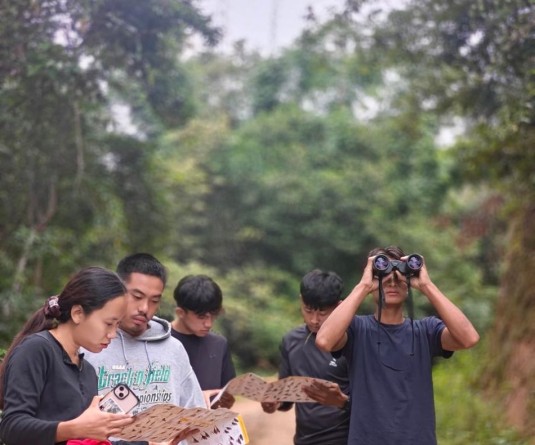
Zavise Rume*
SCERT, Nagaland, Kohima
IN SEARCH OF PEACE
Development brings peace and peace brings development. Where there is no development, there will be no peace and where there is no peace there will be no development. Peace and Development go together and are intrinsically linked.
Therefore, development of human beings in the way of thinking, feeling and doing based on accepted social values should be our priority concern.
Development in North-East region has been hampered by poor infra-structural facilities, paucity of trained manpower, shortage of capital and entrepreneurial skills, high cost of small scale production and marketing problems which do not have potential to create employment. Therefore, resources should be explored and new job avenues be created for youth to bring peace in North-East region particularly in Nagaland.
PEACE exists where the world is viewed as one composite whole, a single community, a fellowship of human beings who have the same instincts of hunger and sex, the same aspirations of generosity and fellow feelings. A Peaceful World is based on a communication of minds and hearts. Peace helps people to become human. It develops a sense of belonging to humanity and strengthens it by connecting man to man.
REAL PEACE in Northeast will happen when people experience peace within themselves and have peace with people in their own community- Nagas enjoying peace with Nagas, Manipuris with Manipuris, Mizos with Mizos, etc. PEACE can be consolidated in Northeast through cultural exchanges and Inter-marriages taking place among people of different communities within northeast region. Similarly, peace among Nagas can be achieved through inter-tribal marriages. Emotional integration within people of different communities in North-East region is very important to achieve sustainable peace in the region.
REMEDIAL MEASURES FOR SECURING PEACE AND DEVELOPMENT IN THE NORTHEAST
• The government schemes and programmes meant for youth should be connected with the youth clubs and youth organisations so that the schemes and programmes are properly implemented through youth clubs or societies
• Law and order of the government alone is not enough to bring about PEACE
• Skill-based job-oriented vocational training facilities should be made available to the youth so that youth are given enough options and opportunities to either opt for higher studies or vocational training for self employment and their livelihood. Vocational training programmes may be designed for students of different stages of education - students of class 8 passed, class 10 passed, 10+2, dropouts and many other professional and technical training courses for graduates and post graduates. Such skill-based job-oriented vocational, professional and technical training courses should be systematically designed in consultation with subject experts, career counselors, educational planners
• The State needs a clear-cut policy on general education and vocational education
• Stipends should be given to poor but brilliant students whose parents cannot afford to support their further education
• Various government schemes implemented for youth should be properly monitored and evaluated in close collaboration with youth clubs or organizations
• Recreational facilities, sports, games and performing arts like dances, music should be provided to youth -Catch them- young programmes should be organized to explore and nurture their talents in any sports or games side by side with educational qualification. Games and sports be strongly formed as part of school curriculum and a strong weightage be given. Institutions offering such courses should be explored and arrangement should be made by the government for such talented students to get degrees or diplomas from such institutions
• Today, youth are restless because they face various psychological and emotional problems. Parents and teachers are aware of their problems but they do not have a professional competence to deal with them. Therefore, Counseling services should be made available to youth like individual counseling, psychological counseling, vocational and career counseling, health counseling to enable them to face the present day complexities, stresses, anxieties and world of work
• Major problems of youth are due to unemployment problem. If each youth is secured in one or the other job for his or her livelihood, then there can be meaningful reduction of social problem. We need to encourage the youth to pursue economically gainful entrepreneurial activities in the agro and allied sector. The government needs to explore and provide financial loan facilities from financial institutions to support the youth in seeking a livelihood promotional programme. I do not see any reason why youth problems cannot be solved if economic independence is assured to each youth through various youth welfare programmes
• The life of youth should be guided by the morals and values of the family. Therefore, parental education on moral values is equally important
• Youth are the most energetic and resourceful citizens of our society. They have potentialities either to develop or destroy a society. Therefore, youth in any society should be taught Peace Education in schools, colleges and universities
• Value Education, Moral Education, Peace Education, Religion and cultural education are very important subject areas that can be introduced in schools, colleges and universities in North-East region to educate the values and preciousness of human life, non-violence and dignity of labour.
“There is no alternative to peace. Peace is the way.”
* Nodal Officer, Guidance & Counseling Cell and Project
Coordinator, Adolescence Education Cell, SCERT, Nagaland
* President, North East Psychological
Counselors Association (NEPCA), HQ. Shillong
(The above is a paper presentation to a Regional Seminar cum Workshop on Peace and Development organised by Ministry of Youth Affairs & Sports, Govt. of India from 7th to 9th January, 2012 at Guwahati, Assam. The author is working in the Department of State Council Of Educational Research & Training, (SCERT), Govt. of Nagaland, Kohima. The views and opinions expressed in this paper are purely personal and do not necessarily reflect the policies and programmes of the Department).




